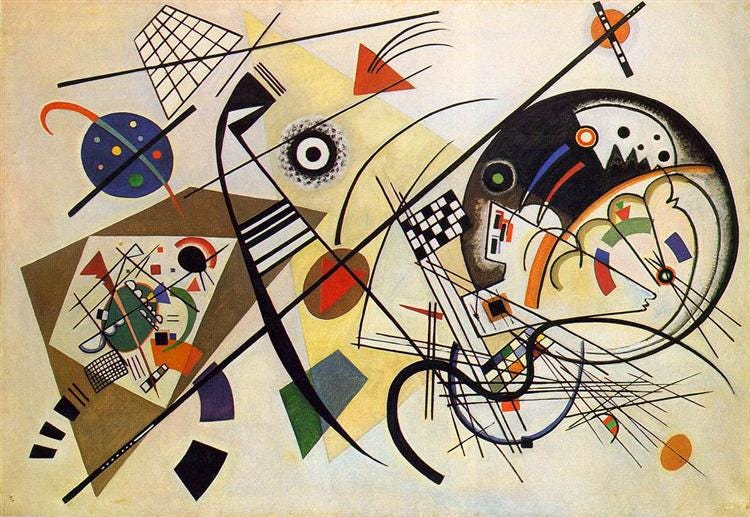Making Space for the Story
How self-understanding and story-sharing open the door to empathy and transformation
This is my third and final piece in a series on gathering differently—especially across lines of difference. In this post, I reflect on the role of story and self-understanding in building empathy, clarity, and courage.
Listening to Story
I had the privilege a few years ago of traveling with a wise, older African man for 10 days in several cities in an East African nation. I was working at the time as a grants officer for a foundation. We visited a number of different organizations and encountered many types of leaders. Nearly all were struggling in some form with the ongoing legacies of civil conflict and an uneasy peace.
I remember especially a conversation we had between meetings at a small, fluorescent-lit coffee shop in a faded-yet-beautiful art deco building in the central business district of a small city. We’d just spent the morning with an organization that was involved in training church leaders, with a special focus on preparing them to deal with conflict. The ironic element was that most of our three-hour visit was spent talking about conflicts within the organization. The organization held so much human potential, and its mission was genuinely beautiful.
And yet something felt profoundly off.
I expressed my unformed sense as best I could and asked my travel partner for his thoughts. I’ll never forget what he said (and repeated on several later occasions): “Peace people don’t necessarily know themselves well.” That simple statement helped me understand so many experiences and serves as an interpretive key in my work. What I have taken from that statement is that we often show up in professional spaces with less self-awareness than the situation requires. This often leads us into performative roles—projecting competence or control—that quietly consume our best energy. This expenditure of energy on performance leaves us too little reserve for the hard and vital work of empathy and care.
The power of self-understanding
“When we attempt to eliminate the personal, we lose sight of ourselves, our deeper intuition, and the source of our understandings — who we are and how we are in the world. In so doing we arrive at a paradoxical destination: we believe in the knowledge we generate but not in the inherently messy and personal process by which we acquired it.” (John Paul Lederach, The Moral Imagination, p. viii)
Reflecting on several decades of work in leadership development and formation, I sense that we try far too hard to eliminate the personal. Creating space for self-understanding when we gather is essential. By self-understanding, I mean the ability to understand and hold one’s own story and history with all of its complexity and explore that story in the concentric circles of context around us. Self-understanding is not a work of arrival at mastery, but rather a journey of emergence.
This focus traces back to the start of my journey. My first academic path was in history. I’ve always thought of myself as a historian. But the roots of this go deeper. From an early age, I was fascinated by the stories of my family: stories my grandmother told of her grandparents moving from farms to small cities in the early 1900s, tales of being the “black sheep” of religious communities, and memories of Hungarian miners trying to make their way as immigrants in the years after World War I. There is no single story—just interwoven threads, with only my sister and me as the common denominator.
When I think about the work of self-understanding, my tools are often story tools. As a grant-maker, I often found people nervous, fearful of wasting my time, and eager to “make their pitch.” I’d slow the process, shifting it from what do you do? to who are you?—often by asking story-rooted questions at an intentionally slower pace.
Tell me how your organization came to be? What were some of the turning points?
Where did you grow up? How did you get involved in this work?
Tell me about when you learned….?
Usually, some variation on these questions would shift the dynamic, slow the conversation, signal that I was interested in more than just executing a grant. I’d gladly answer any questions they asked me. I often found that asking historical questions was messy. Sometimes, it raised things that I didn’t expect. Especially where conflict simmered beneath the surface.
Looking back, I can see a key lesson:
Exploring our stories requires safety
It isn’t easy work
It’s fraught and chaotic
As a facilitator, I learned that bringing our stories to the surface can be tricky. More than once, I experienced the surfacing of deeply painful stories. Several stories drew deep linkages between professional challenges and childhood and family wounds. The word “chaos” came up a lot as people tried to trace out their stories. I know I wasn’t always quite ready to hold what came up. But I’m glad we went there together. As one participant said “it just feels very good to talk about myself and to hear others talk about themselves. We don’t do that much.”
So why do this hard work?
Shining light on our stories brings deeper understanding and even healing. One participant talked about the power of drawing “through lines” in her life connecting some of the realities of her birth family and her intense awareness of power dynamics and marginalization in her current work. She was able to name how she also recognizes that her sense of powerlessness as a child can now lead her to shoulder far too much responsibility to save people today. I felt humbled to share learning space with her, and saw my own story with greater clarity.
Building to Empathy
Speaking about self-understanding can sound a bit like a fixation on introspection and the individual at the expense of the collective. I’ve certainly experienced a lot of this dynamic in the literature on discovering one’s true or authentic self and the general field of self-help. Such language can atomize us and pull us into self-focus.
But self-understanding can be a means to a greater end.
Better understanding of our own stories and carefully hearing others’ stories across significant lines of difference helps to strengthen the connective tissues between us. It strengthens our empathy muscles. This binds us together, undermines us vs. them thinking, and allows us to see our interdependence with greater clarity. It also allows us to stumble about to find language that communicates across differences, whether those differences are cultural, linguistic, sectoral, or disciplinary. That stumbling can be so powerful and productive.
I know I’m not the first to recognize the power of story in building empathy. I am struck, however, by how I’ve seen people come to see themselves more clearly, both their might and their fragility and renewed recognition of the potential in a human life. One participant I worked with, reflecting on the process, said “I see myself. I’m beginning to see how I need to be in the world.”
Self-understanding increases a sense of potential. And yet at the same time it plays a powerful role in reducing an unhealthy sense of responsibility and isolation. As another participant reflected on process, she noted that it brought out in her “a willingness to be small, to not insist immediately on power, to recognize that in our smallness we are enough.” That blend of potential and healthy responsibility creates conditions for action: an ability to lean in with one’s full self, knowing that you are part of something much bigger and deeply connected. Self-understanding can create the spaciousness and graciousness we all need to be bold, to try, to fail, and to learn.
These thoughts are more a beginning than an answer. I’m delving more into narrative psychology as a means of deepening my own understanding. But for now, I’m left with a conviction that story does matter. Slowing down enough to hold story helps us to be better.
For Reflection
What part of your story—personal, cultural, or vocational—feels like it most wants to be heard or understood right now?
When was the last time you felt fully seen—and how did that affect your ability to show up with empathy or courage?
Where might you be performing rather than showing up as your full self—and what would it take to step out from behind that role?
What’s Shaping Me Lately
Deborah Doane’s book The INGO Problem helped me reimagine risk—not as a cost borne by one party, but as something that can and should be shared across funders, implementers, and communities. I wish I’d had this frame earlier in my career.
Jason Lewis’ article on direct mail fundraising challenges deeply held assumptions in the nonprofit world, especially around how we communicate and fundraise. His critique of the mechanization of direct mail made me reflect on how often we prioritize systems over relationships. It reminded me that the more distant we get from people, the more we lose the heart of the work.
Iman Mills Gordon’s and Ericka Stallings’ piece on liberatory leadership pushed me to consider what it means to move beyond reforming current systems to imagining entirely new ones. While honoring current equity practices, the authors challenge us to dream bigger—to create leadership models rooted in liberation, not just representation. That feels both urgent and deeply hopeful.
My friend Andrew DeCort’s essay on gentleness was a balm. In a time that rewards aggression and urgency, he reminds us that gentleness is not weakness—it’s pure power. His writing gave me permission to lead with softness, to trust that strength can look quiet and kind. I sense I’ll return to it often.
Let’s Talk
What’s a story in you that’s asking to be heard right now? I’d love to hear what this stirs for you—feel free to reply or leave a comment. It’s always encouraging to hear from readers!
Reach out at jason@jasonferenczi.com or check out my website at www.jasonferenczi.com.'





